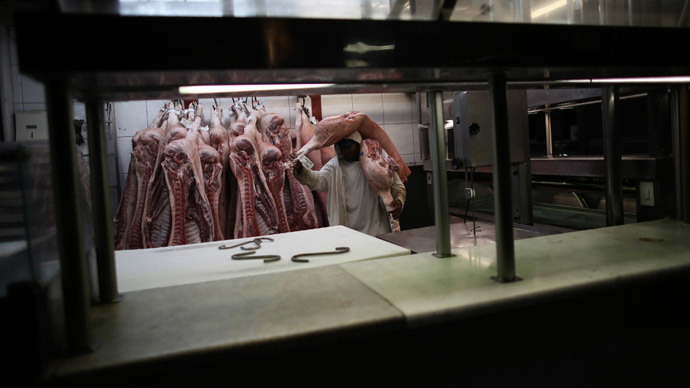US facing sanctions after defying WTO trade rules

The United States could soon be facing sanctions as a result of a ruling handed down by the World Trade Organization this week concerning an American meat labeling law contested by officials in Mexico and Canada.
On Monday, the WTO decided against the US and said the nation’s country-of-origin labeling law is in violation of international fair trade rules.
America’s country-of-origin labeling, or COOL, law mandates that the packages of most beef, poultry, pork and lamb sold in the US clearly list where the animal in question was born, raised and harvested. Canada and Mexico have called this COOL law unfair, however, and said it unfairly discriminates against exports from those countries. Indeed, Reuters noted this week that Canadian pig and cattle exports to the US have diminished since 2009 — one year after the current COOL law was adopted in the US.
In a statement Monday, the WTO sided with America’s neighbors and said that US COOL laws have “a detrimental impact on the competitive opportunities” of livestock that’s imported, “and thus accords less favorable treatment.”
America’s COOL law, the WTO said, “necessitates increased segregation of meat and livestock in the US market, entails a higher record-keeping burden and increases the original COOL measure's incentive to choose domestic over imported livestock."
The WTO ruled previously in June 2012 that American COOL laws unfairly discriminated against Canadian and Mexican meat and, in response, told the US to adhere to certain changes. Now with the WTO ruling once again against the US, possible sanctions are now reportedly on the horizon.
"Basically the (WTO) Appellate Body has told them three times now to get rid of mandatory country of origin labeling," Canadian Agriculture Minister Gerry Ritz told Reuters. "I don't see any negotiation, other than how long it's going to take to make that happen."
In a statement sent to Canadian media, Ritz saluted the WTO’s latest resolution.
"Today's WTO compliance panel's report reaffirms Canada's long-standing view that the revised US COOL measure is blatantly protectionist and fails to comply with the WTO's original ruling against it," Ritz said on Monday. "The WTO's clear and consistent findings in support of Canada's position effectively supply a clear message to the US — end this protectionist policy that creates economic harm on both sides of the border and comply with your international trade obligations.”
Trade representatives in the US now have 20 days to appeal the WTO’s ruling, Reuters reported, but, should it fail to adopt new labeling rules, then Mexico and Canada may be given the clear from the group to begin imposing trade sanctions.
Bob McCan, the president of the National Cattlemen’s Beef Association, acknowledged to the Financial Post that the WTO ruling may have a negative effect on American agriculture.
“The announcement today by the WTO dispute panel on the US Country of Origin Labelling rule brings us all one step closer to facing retaliatory tariffs from two of our largest trading partners,” McCan said Monday.
If Canada is given the go-ahead by the WTO to impose sanctions, then Ritz said certain agricultural products will soon be targeted.
"We will target everything from California wine to Minnesota mattresses, not to mention the over $2 billion in US beef and pork sales to Canada," Ritz told The Canadian Press. "We will do whatever it takes to stand up for an integrated North American beef industry and we will not rest until this work is done."
“Canada and Mexico will remain vigilant to ensure the harm generated by the protectionist COOL policy is brought to an end and that international trade commitments are respected,” representatives from both nations said in a joint statement this week. “We remain committed to using the WTO process to reach a satisfactory resolution to our concern, including if and as necessary, seeking authorization to implement retaliatory measures on US agricultural and non-agricultural products.”














